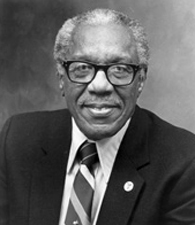George Crockett Jr. was a prominent attorney and politician with a career that lasted nearly six decades. An outspoken man who didn’t shy away from controversy, he passionately defended communist leaders, openly protested apartheid in South Africa and served as a Civil Rights activist.
George Crockett Jr.’s Early Days
George W. Crockett Jr. was born on August 10, 1909, in Jacksonville, Fla. He attended public school and moved on to Morehouse College in Atlanta, Ga., where he earned his Bachelor of Arts degree. Crockett Jr. graduated from the University of Michigan Law School in 1934, then returned to Jacksonville, where he began practicing law as a senior attorney.
Crockett Jr.’s Notable Accomplishments
In 1937, Crockett helped found the first interracial bar association in the United States: the National Lawyers Guild. After that, he became the first African American lawyer hired by the Department of Labor and handled employment cases under the National Labor Relations Act. He was also a hearing officer for the Federal Fair Employment Practices Committee. His experiences helped him become aware of racial segregation in labor unions, leading him to become director of the Fair Employment Practices Department of the International United Auto Workers (UAW) Union in 1944. The UAW post returned him to Michigan.
During the 1970s, Crockett was a judge in Detroit. The city was racially divided, with the white population terribly afraid of the black population. A combination of factors, including a 1967 riot, an inadequate police and court system and an urban renewal project that demolished ghetto homes without replacing them, made the city tense. Crime was a serious problem. Time magazine said the city required “a fairer administration of justice,” and described George Crockett as a man fiercely committed to that cause.
George represented the state of Michigan in the U.S. House of Representatives from November 4, 1980, to January 3, 1991. He filled a vacancy left by Representative Charles C. Diggs Jr.
Sources in this Story
- African American Registry: George Crockett
- BlackPast.org: Crockett, George William, Jr.
- Time: Judge in a City of Fear
- Biographical Directory of the United States Congress: Crockett, George William, Jr.
- The New York Times: Papers detail decades of FBI surveillance
- The New York Times: George W. Crockett Dies at 88; Was a Civil Rights Crusader
The Rest of the Story
From 1940 to 1975, the FBI conducted a secret surveillance campaign and compiled several reports about members of the National Lawyers Guild. In 2007, archivists were granted access to those documents for the first time. One of the entries about the Guild contained a 1966 memo from J. Edgar Hoover’s office, directing agents to thwart Crockett’s efforts to become a judge. These documents will be sealed from the public until 2025, and then released to the National Archives and Records Administration.
Much of Crockett’s career was spent championing Civil Rights issues. He famously served as a lawyer for the leadership of the Communist Party, and also released a majority of the 140 people taken into custody after a shootout between law enforcement and members of the Republic of New Africa. Crockett took a noteworthy stand against apartheid and “white-minority rule” in South Africa by protesting at the South African embassy; he was arrested for his actions.
Crockett died on September 7, 1997, at 88 years old. Of his efforts for racial equality, The New York Times said Crockett frequently “operated so far beyond the trenches that it was often decades before society caught up.” He was viewed as a hero for his efforts to help African Americans, and seemed to maintain his affinity for controversy through the end of his career. Before retiring in 1991, Crockett became the first congressman to call for the decriminalization of drugs.
This article was originally written by Lindsey Chapman; it was updated July 9, 2017.











